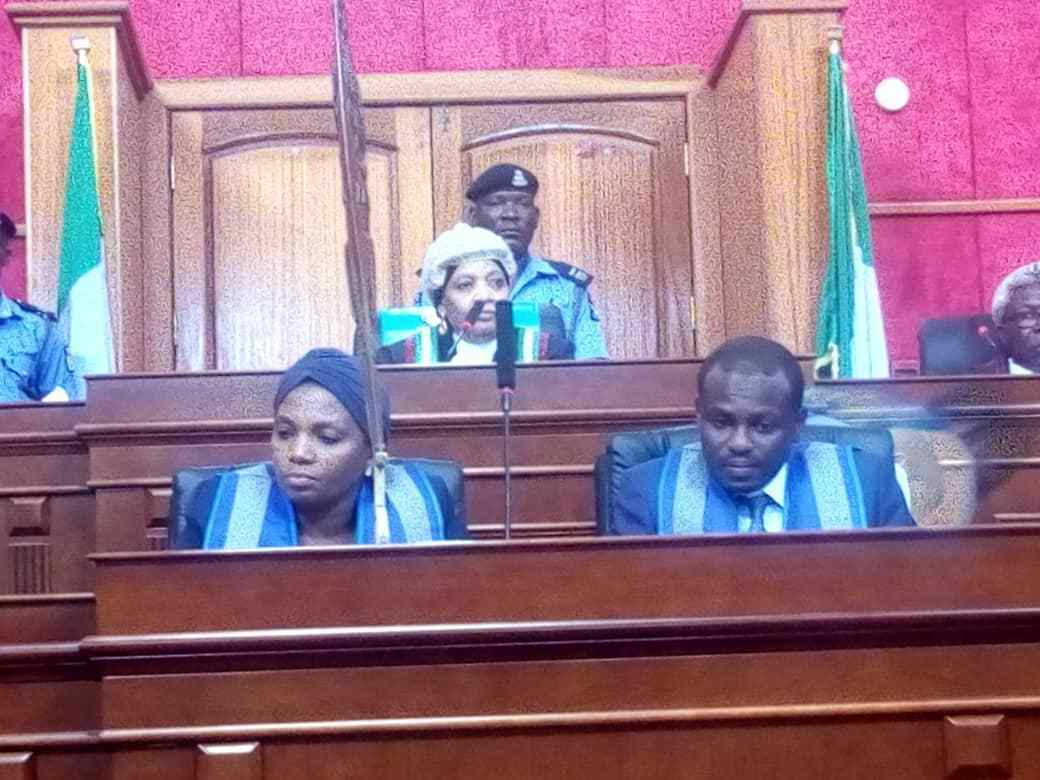Why Appeal Court President withdrew from presidential election tribunal
The Court of Appeal President, Zainab Bulkachuwa, has recused herself from presiding over and being a member of the presidential election petition tribunal.
She mentioned ‘personal ground’ as a reason for her decision.
Mrs Bulkachuwa announced the decision after a five-member panel of the court ruled against the application brought by the Peoples Democratic Party (PDP). The opposition party and its presidential candidate, Atiku Abubakar, had challenged her membership of the tribunal on account of her relationships with two members of the All Progressives Congress (APC).
The PDP and Mr Abubakar are challenging the victory of President Muhammadu Buhari of the APC in the February presidential election.
The PDP had approached the court after the inaugural sitting of the tribunal on May 8, accusing Mrs Bulkachuwa of “having the likelihood of bias,” on the grounds that her husband, Adamu Bulkachuwa, and her son, Aliyu Bulkachuwa, are both members of the APC.
Mrs Bulkachuwa’s husband was controversially picked by the APC to represent the party ahead of the 2019 senatorial elections. He won the eventual senatorial election.
The PDP also asked Mrs Bulkachuwa to recuse herself from further presiding or participating as a member of the tribunal after the party cited some of her comments during the tribunal’s inaugural seating.
Part of the comments included Mrs Bulkachuwa’s submissions that, “no matter how well elections are conducted, there were bound to be complains.”
Arguments Of Counsel
According to the PDP and Mr Abubakar, Mrs Bulkachuwa’s comments implied that she had already prejudged the elections to have been well conducted.
The lawyer who spoke on behalf of the PDP, Levy Uzoukwu, said the inferred predisposition of Mrs Bulkachuwa rendered it difficult to prove a major point of their petition before the court.
He further requested Mrs Bulkachuwa to recuse herself on the grounds that, “justice must not only be done but must be seen to be done.”
Mr Uzoukwu also cited sections of their application which, according to him, amounted to the real likelihood of bias against Mrs Bulkachuwa.
“The question is not whether she will be biased. But whether there were credible evidence to prove that she has a likelihood of bias,” Mr Uzoukwu argued
He added that Mrs Bulkachuwa herself had asked that judges in the tribunal should be divested from all forms of bias, hence the need for her to recuse herself in the given circumstances.
After making his submission, the lawyer representing the Independent National Electoral Commission, Yunus Usman, said the fact that Mrs Bulkachuwa is related to politicians cannot be the yardstick for the request that she should recuse herself.
He added that the constitution does not allow for such discrimination and that the provisions of the constitution are wide enough to ensure justice prevails for all parties.
According to Mr Usman, Mrs Bulkachuwa’s relationship with members of the APC cannot serve as a yardstick for judging her.
Mr Usman added that if relationships are to be considered in deciding the membership of judicial panels, then it will be practically difficult for any jurist to seat in judgement since most of them are related to one politician or the other.
Wole Olanipekun, who represented President Buhari, noted that by virtue of Section 239 of the constitution, only the Court of Appeal has exclusive jurisdiction to determine if a person has been validly elected into the office of the president of Nigeria or not.
He said the president of the court is empowered to either seat on the tribunal’s panel or select members who will sit on the panel.
He added that only the president of the court had the final say on whether or not she should sit as a member of the panel.
In his arguments, the lawyer who represented the APC, Lateef Fagbemi, also said the cases cited by the petitioners in support of their arguments were inapplicable to their request and can therefore not be relied upon in the instant case.
He noted that Mrs Bulkachuwa had conducted herself with utmost decorum in the years when she served as a member of the bench.
According to Mr Fagbemi, the conduct of Mrs Bulkachuwa has made it practically impossible for her to be accused of bias in the discharge of her duties.
He, however, encouraged Mrs Bulkachuwa to recuse herself to avoid any perceived dent on her person.
The Judgement
After reading through the arguments of counsel, a member of the panel, Peter Ige, who read the judgement, said the submissions made by the applicants showed that Mrs Bulkachuwa was only being accused of the likelihood of bias.
“As can be seen from the prayers and the grounds, the President of the Court is not being accused of bias. However, she is being accused of the likelihood of bias.
“That fear is born out of the relationship she shares with prominent card-carrying members of this panel.
“I am of the sole view that no such inference can be reached from the above statement. I am of the firm view that enough materials have not been placed to show that the Honourable president has the likelihood of bias.
“The fact that she is the mother and wife of the APC members is not enough to require that she recuse herself. Her family members are not parties in the instant suit,” Mr Ige said. The judge then ruled that the application had failed and was subsequently dismissed.
The Withdrawal
After the ruling, Mrs Bulkachuwa said that she insisted that the trial to be heard in full so that the place of the law would be noted. She, however, added that she was recusing herself “on personal grounds.”
“I will, however, recuse myself on personal ground,” Mrs Bulkachuwa said.
She added that her decision was taken to ensure that no female jurist is discriminated against in Nigeria’s future.




